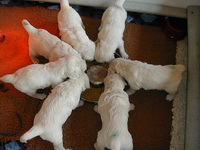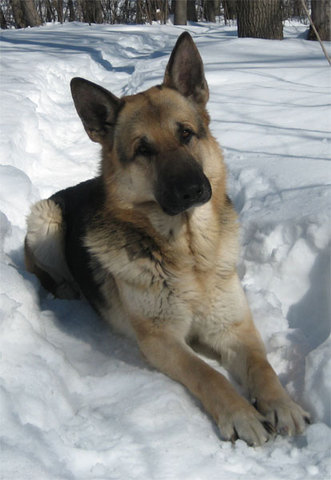Vitamin mineral supplements and dietary supplements
 In addition to proteins, carbohydrates and lipids, vitamins and minerals must be present in the diet of dogs. Some of them are already contained in food products, and the deficiency requires replenishment due to special additives (dressings, premixes, supplements).
In addition to proteins, carbohydrates and lipids, vitamins and minerals must be present in the diet of dogs. Some of them are already contained in food products, and the deficiency requires replenishment due to special additives (dressings, premixes, supplements).
Top dressing can be divided into two large groups: chemically synthesized and natural. Natural sources of mineral substances include finely pounded eggshells, bone, meat and bone and fish meal, as well as calcium from the shells of marine mollusks. As a natural source of fat-soluble vitamins A, D, E, fish oil is traditionally used. A useful feed supplement and sources of B vitamins is an extract from yeast.
Keep in mind that the usefulness of such supplements of natural origin is directly related to the quality of their natural sources. For example, fish oil can do much more harm than good, as sea fish is increasingly becoming a source of accumulation of hazardous substances (oil products, heavy metals, industrial poisons) in an environmental disaster.
Bone and meat and bone meal is often made from carcasses of culled or dead animals and can be a source of infection with dangerous diseases. That is why for feeding dogs use sterilized bone and meat and bone meal, disinfected by high temperatures.
Eggshell is added to dog food milled into powder, since there is little use from pieces that pass through the digestive tact. It is easiest to turn the shell into flour on a coffee grinder. To avoid contamination with salmonellosis, use the shell of boiled eggs.
As for tablets containing brewer’s yeast, dogs with sensitive stomachs react to their introduction into the diet with meteorism and loose stools. To enhance the intensity of staining tan owners of Rottweilers and Dobermans have long used sea kale. Some dogs are happy to eat a salad of these dark green algae, others flatly refuse to chew this “gift of the sea”, in the third seaweed causes digestive problems.
Experienced dog breeders are probably familiar with drugs such as gluconate and calcium glycerophosphate, sold in the “human” pharmacy. Modern breeders practically do not use them, however I have repeatedly witnessed how these simple preparations saved lives of puppies.
… About 8 years ago I was given a 4-month-old German Shepherd puppy named Dick as a candidate for sleeping. In a private and rather expensive veterinary clinic, a terrible diagnosis was made for the baby – hip dysplasia. The puppy’s appearance was really bad: the ears hung like a donkey, the front legs were very soft, bending in the manner of rubber, pasterns, and the little dog did not get on its hind legs, moving in the manner of rabbit jumps. On the ribs in the points of articulation with the sternum, I felt a thickening – “beads”. I ask the owners: “Did x-rays to confirm dysplasia?”. “No,” they answered, “they did not.” How do I think these “miracle doctors” diagnosed? And offer to put to sleep! I began to feel the puppy, his legs in his hip joints rotate and pull. Dick is silent, does not whine and does not cry. And with dysplasia, pain is a sure sign of destructive changes in cartilage. I say to the owners: “This is not dysplasia. But rather like rickets. If the dog is dear to you, you will have to tinker a few months. This family had little money, so the medical recipe consisted of calcium gluconate, calcium glycerophosphate and phytin as mineral preparations, and vitamin A and D2 in oil as catalysts. The owners also tried to increase the share of meat products in the diet, buying stomach, beef heads, chicken neck, liver. At my insistence, at least one feeding was replaced by a handful of high-quality dry food. The head of the family was so imbued with responsibility that he himself did the massage of his pet’s paws, gradually increased the duration of the walks, moving from a leisurely movement to a quick step, and then to running. And six months later, there was no sign of threatening symptoms. The physical development and beauty of the dog could envy many lovers of German shepherd dogs. So, the owner’s love in combination with calcium phosphate saved the life of the dog.
The spectrum of synthetic preparations containing minerals, vitamins or their complex is unusually wide. Various manufacturers offer similar feeds for dogs in the form of powder, tablets or liquid (spray).
Loose form of dressing – the most traditional. However, many dogs resolutely refuse to eat the food in which powder is added. Supplements in tablets are more convenient to dose, following the manufacturer’s recommendations, printed on the packaging. Usually, flavors and flavor enhancers are added to the tablets, so the more compliant dogs eat them themselves, and you can simply put the pills in the throat or force them to swallow them with pieces of preferred food.



